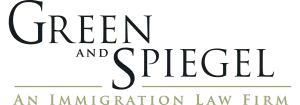- within Immigration topic(s)
- in United States
- with readers working within the Aerospace & Defence and Retail & Leisure industries
As a follow up to our post this morning on Friday's Proclamation that added a $100,000 fee for H-1B petitions, we are sharing updated from the Administration. Despite clarifications today, we will expect litigation on the remaining issues.
We now know that:
1. The $100,000 fee is a one-time fee tied only to new H-1B petitions.
A short USCIS memo today confirms that individuals who already hold H-1B status will not have to pay the $100,000 fee now for a petition already filed and approved. The fee seems intended to apply to winners of the H-1B lottery next year, but seems to apply to petitions filed Monday or after. That is a major area of concern as there is no mechanism to pay the $100,000 now, and H-1B sponsors were certainly not expecting this. We can expect confusion in the USCIS mailroom until this is clarified fully.
It is not clear whether petitions separate from the lottery (such as for colleges, universities, nonprofit academic medical centers, and research organizations) will have to pay the $100,000 fee.
USCIS has a process for updating filing fees – either by a law passed by Congress, or by regulation. This has not been done by Proclamation before, and that will certainly be challenged.
2. Individuals who already hold H-1B visas — including those currently abroad — will not be required to pay this fee to reenter.
H-1B visa holders who were nervous about traveling to or from the U.S. can now move forward with their plans. We note that despite a formal memo issued by CBP on X today, it is possible there will be confusion or inconsistency among the 50,000 plus employees at US Customs and Border Protection (CBP). Particularly, since any training is just beginning – we understand that CBP, DOS and USCIS officers were not given advance notice, guidance, or training before the Proclamation was issued.
Given the rapid changes, we recommend that those planning to fly to the U.S. tomorrow or Monday at least consider pushing back their trip, if possible, to give time for guidance to be circulated. When there is formal guidance issued, we will share that and recommend printing it to carry on entry to the US.
Individuals who already hold H-1B status or have H-1B visas in their passports, are not affected. It is not clear if new H-1B petitions filed next week (for first time H-1B employment) are covered. It seems the intention (based on White House press secretary statement) is that the $100,000 fee will be apply to petitions filed after winning the 2026 H-1B lottery, but that is not clear in the new memo.
Background
The Proclamation relies on Section 212(f) of the Immigration and Nationality Act, which the administration has been using, including for the travel ban from certain countries. INA 212(f) has not been used in this way – to restrict entry for people based on how their petition was filed with USCIS. That will also certainly be challenged.
The Proclamation states it is based on alleged examples of H-1B program abuse. The two authors of this blog have decades of experience with the H-1B program. The vast majority of the H-1Bs we have seen have been bona fide – for healthcare workers, teachers, researchers, and a host of other occupations. This Proclamation is an example of throwing the baby out with the bathwater. There were442,425 H-1B petitions approved in 2024 – a significant part of the workforce.Data show that over 50% have advanced degrees, making also a highly skilled workforce overall.
There are existing important mechanisms to police the H1B program. Every new H-1B filed includes a $500 anti-fraud fee, and USCIS can and does conduct site visits. There are already resources to address any fraud in the system. This Proclamation creates fear and uncertainty for those using the H-1B program lawfully.
Other Provisions of the Proclamation
The Proclamation has an exception for those whose work is determined to be "within the national interest." There is no guidance on this – we expect different industries and trade associations to be pushing for blanket national interest exceptions.
The Proclamation also importantly sets out an broad agenda for future limits to the H-1B program. It will be very important to follow these carefully.
- By spring 2026, the Secretary of State, the Attorney General, the Secretary of Labor, and the Secretary of Homeland Secretary should submit a recommendation about extending the Proclamation.
- The Secretary of State will issue guidance about the "misuse" of B visas.
- The Secretary of Labor will revise the prevailing wage levels and DHS will issue a regulation to prioritize the admission of high-paid workers.
The content of this article is intended to provide a general guide to the subject matter. Specialist advice should be sought about your specific circumstances.



